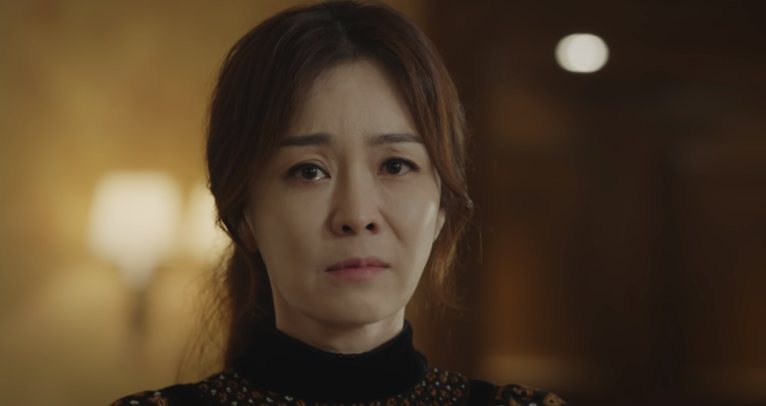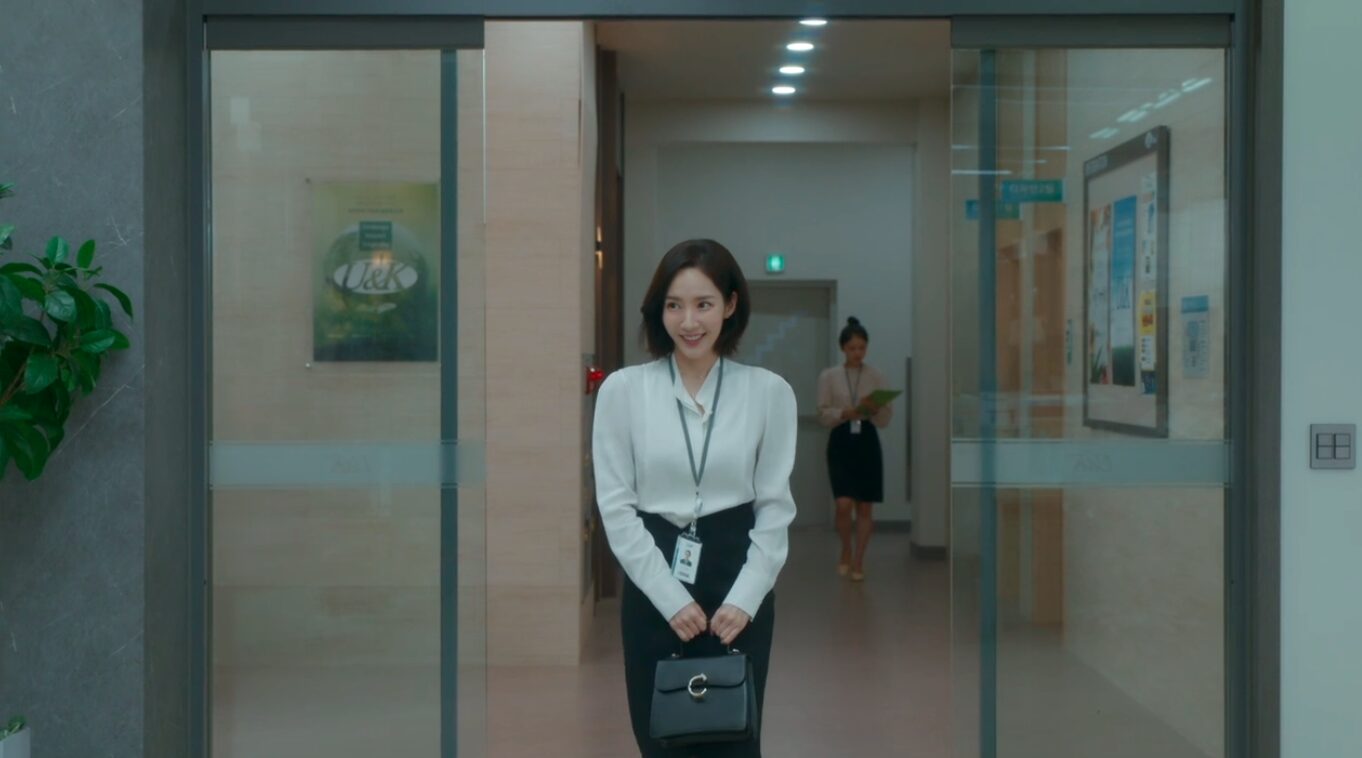It was the end of the first episode of the dark social satire, Sky Castle (2019).
I, like a lot of viewers, was trying to get my head around this strange beast. An unexpected breakout hit, it broke rating records (over 20%) and swept the Baeksang awards as well. It also got a Netflix pickup, which expanded its audience even further.
Billed as a satire, I sat through the first very unfunny episode trying to find solid ground on which to plant my feet and to see what it was that had made this the highest-rated cable drama in Korean history at the time.
And there it was.
After a social occasion filled with niceties, civility and a sense of competitive tension, perfect mother of the perfect family, Lee Myung-joo (Kim Jung-nan) turns and surveys the facade of her perfect life with a look of mounting sadness and desperation.
She then breaks the fourth wall; looking straight at us, the audience, with devastation on her face.

Sky Castle is neither the first nor last drama to break the fourth wall. The conceit itself is common. But there have been few examples so effective as this one.
It’s not just that we, the audience, get to see a face that this woman has been hiding from everybody.
It’s the entreaty in it. The sense that she wants desperately somebody to see her pain, to step through the frame, and to save her from herself. And yet, she’s only letting us see it because we are the audience: disinterested observers. Our opinion, our sympathy, even our empathy is meaningless to her.
Everything that she believe matters, everything that she has been taught to believe matters, it has turned to dust.
And all we can do is watch.
What is the fourth wall?
At its simplest, the fourth wall is the audience. Whether in a theatre or on a sound stage, the room in which the actors perform has only three walls. The fourth wall is the audience itself, whether literally seated in front of the stage or figuratively situated through the screen.
The fourth wall is an invisible barrier that turns the audience into silent, uninvolved observers. When it’s broken, it can be a way to invite the audience in to the narrative. Breaking the fourth wall is therefore a common trope in comedy as it invites the audience to share in the joke. It’s also the defining characteristic of theatric traditions such as panto (classic pantomine) where audience participation is encouraged.
In the case of film or television, the fourth wall is dealt with by stylistic convention such as actors not looking directly at the camera. It helps to create the suspension of disbelief needed for an audience to get caught in a story rather than seeing the way in which it’s been constructed. A way to create a distance between the narrative and ourselves. A way to place the audience in the role of distant observer rather than participant.
By looking at or directly speaking with the audience, the writer or director is making a deliberate choice to suspend that suspension, if you will. To invite the audience into the frame as a part of the story. To break the fantasy that we are outsiders looking in.
When done well, a fourth wall break can be funny, mischievous, meta, emotional or devastating.
I’ve compiled a list of some of my favourite fourth wall breaks. However, these don’t even scratch the surface of the device in Korean dramas, let alone in popular culture. Nonetheless, these are the ones I found the most powerful and the most effective.
5. Zombie Detective
There are few dramas out there as hilariously, joyously meta than the 2020 comedy, Zombie Detective. And while I personally dropped this drama, its premiere week delivered probably the funniest two episodes of television I’ve ever seen.
Our eponymous undead detective, Kang Min-ho (Choi Jin-hyuk) wakes up a zombie with no memory of his past life. He then steals the identity of a private investigator and proceeds to solve crimes, including the mystery of his own past.
The first two episodes of Zombie Detective are a gleeful mess of pop culture references and fourth wall breaks as our hero attempts to navigate the world as a flesh eating zombie. After he blacks out and wakes up covered in blood with the corpse of a dead rabbit beside him, he tries to die by throwing himself off a cliff. He then opens his eyes, rolls over and looks at us as if to say, “Can you believe this shit?”
It’s a deliberate wink at the audience, an invitation for us to join him in the giant in-joke that is the show’s mashed up meta references to everything from Train to Busan to Warm Bodies. An invitation also for us to see this zombie thing from his point of view – not from our perspective as potential human victims but from the poor person turned into a zombie against their will. The subversion of a zombie going from nameless monolithic threat to tragic protagonist.

4. Sky Castle
Sky Castle’s devastating fourth wall break at the end of its premiere week is not the only one used by the director during the drama’s run. The drama’s antagonist, Kim Joo-young (Kim Seo-hyung), gives several powerful examples of the technique as well, giving a wink to an audience who can see what she’s doing even as the other characters are wilfully blind to it.
An academic tutor who sells her services to families wanting their children to go to the best universities, she is a bitter and twisted soul determined to punish her pupil’s parents by giving them exactly what they ask for. Even if it breaks them.
And while it’s hard to choose just one image of this amazing actor’s ability to convey so much emotion in so little time, this fourth wall break is the final scene of the drama. Its message is that people like Kim Joo-young will still exist so long as we keep feeding families into the gristmill that is the Korean education system.
This story has a happy ending, it says. This story is a comedy. The next one will be a tragedy.

3. My Fellow Citizens
This 2019 comedy drama with the stellar cast – Choi Si-won, Lee Yoo-young AND Kim Min-jung – was an enjoyable romp that charted the political career of a con artist who is blackmailed by a loan shark.
Kim Min-jung was the loan shark, Park Hoo-ja, a complex and almost delightful antagonist that won the audience to her side with her antics. We wanted Choi Si-won’s con artist lead, Yang Jung-kook, to win. But we also did not want Park Hoo-ja to lose.
The character delivered several fourth wall breaks throughout the drama’s run, but none so iconic as her famous Mukbang-esque cake eating scene where she systematically and joylessly devours a giant slice of frosted sponge before looking straight at the camera, almost daring us to take issue with her. She licks her lips as though she’s feasting on her enemies. Yet the scene comes straight after Yang Jung-kook delivered an unexpected blow to her plans so the whole thing comes with a kind of grim determination.
I will beat you, she is saying.
To the cake, to Jung-kook and to us.

2. D.P
In terms of using the fourth wall break to convey hopelessness and desolation, 2021’s brutal critique of the Korean Army, D.P. ends with one that rivals even Sky Castle’s premiere.
Ahn Joon-ho (Jung Hae-in) is a young soldier forced into the military as part of Korea’s compulsory military service. Faced with the vicious hazing and bullying of the service, he manages a kind of escape by being reassigned to a military police team that is allowed out to bring back deserters.
While the drama investigates the reasons that young men desert the military, it also tells of the tragic consequences of the culture on young men with no choice but to serve for a full two years. D.P. brilliantly asks us to celebrate Joon-ho’s ability to keep himself safe from the violence around him and then eventually to ask ourselves why he stood by while others were subjected to the horrors he himself escaped. A question he himself is forced to tackle.
As the drama comes to a bleak, almost hopeless conclusion, Joon-ho simply stands, shell-shocked, as he stares blankly through the camera at the audience.
This is what you are doing to us, his face says through empty eyes. This is what you have done to your sons.
He is still alive. But he is broken.

1. Sky Castle
It’s probably no surprise that my number 1 fourth wall break is the one that started this post. And I probably should have saved this for my dazzling conclusion, but this moment is so powerful and so perfect that it’s only right that it bookends this post.
Sky Castle is a surprisingly dark and searing polemic on the elite’s obsession with educational achievements. The show follows the lives of four families living in a luxurious residential area called SKY Castle and charts the increasingly crazed machinations of the housewives and their doctor husbands who live in it. It looks at the intense pressure to get children into the SKY universities in Korea – Seoul National University, Korea University, and Yonsei University – and the way in which women in particular are forced to subsume their own lives and aspirations into the success of their children.
The show starts with a tragic and shocking suicide, one that is incomprehensible to the other women living there. Lee Myung-joo (Kim Jung-nan) seems to have the perfect life predicated on the achievement of getting her son into SNU. But, unbeknownst to the other mothers, she has in fact failed.
Given a ceramic symbol of motherhood as a gift, she places it next to a photo of idyllic family life and turns her true face to the camera.
It is nothing but desolation.
If there was an image that sums up Sky Castle as a drama, then it is this one. A woman decimated, a family destroyed, a community left reeling.
And for what?





Wow, LT, you’re on a roll at the moment!
😊❤️
I’ve just remembered – the fourth wall break in Nobody Knows might be one of my favourites! Before Eun-ho throws himself off the rooftop, he pauses to look at us with one last desperate plea, conscious that it might be the last time he sees us. And then he jumps. It’s still bone-chilling.
Fantastic post! Thanks LT, and I agree your #1. Despite disappearing from the drama after Ep 1, her character continues to haunt everyone including us as audience till the end.
Another excellent post, LT! I’m off topic here (will circle back, I promise!), but I loved Zombie Detective and it convinced me that Choi Jin Hyuk was made to play a tortured, morally virtuous zombie. I haven’t been able to enjoy him in other roles as much since (except maybe Mr Queen), and he’s frankly wasted in romantic dramas. Anyway, I hadn’t even clocked that the fourth wall break(s? Does it happen repeatedly, I’ll have to rewatch now!) could have contributed to my love for the show, but you’re right. For me, it was super effective at eliciting a sense of camaraderie with uri chumbie and his plight from the get-go.
I think my favourite example of 4th wall breaks (in a non-Korean show) is Fleabag. Pheobe Waller-Bridge does such a great job of making the audience feel like they’re in on it all with her. So good.
Do you have examples of where it’s executed really poorly?
Hmm… what an interesting question. I think it can be overused so that it loses its impact. I’ll have to think of a time where it happened and it just didn’t work at all.